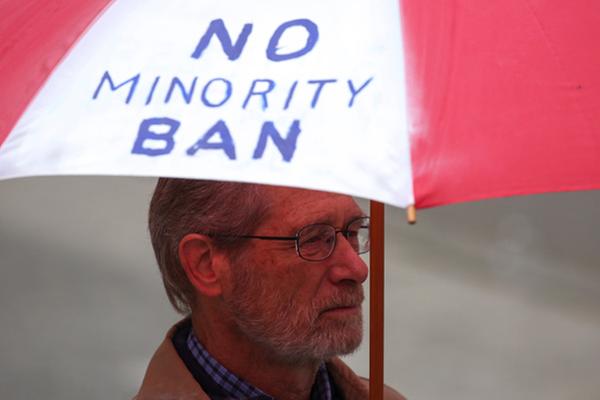US appellate court again rules against president's travel ban
Xinhua | Updated: 2017-06-13 08:52
 |
| A man holds an umbrella during a protest of US President Donald Trump's travel ban outside of the US Court of Appeals in Seattle, Washington, US May 15, 2017. [Photo/Agencies] |
SAN FRANCISCO - A three-judge panel of a federal appeals court ruled Monday against reinstalling US President Donald Trump's travel ban.
The motions panel of the US Courts for the 9th Circuit presented its decision in 86 pages of written opinion, stating at the end that "The Government's motion for a stay (of the travel ban) pending appeal is DENIED as moot."
The travel ban, the second of the kind, was blocked on March 15 by US District Judge Derrick Watson in response to a suit by the state of Hawaii.
The panel heard on May 15 in Seattle, Washington state, Acting US Solicitor General Jeffrey Wall on behalf of the Trump administration and Neal Katyal, an attorney representing the state of Hawaii, argue about whether the nationwide temporary restraining order (TRO) imposed by Judge Watson should be lifted and the travel ban as part of a presidential executive order reimposed.
"The district court did not abuse its discretion in entering a nationwide preliminary injunction," the judges wrote in their opinion.
The second travel ban, signed by Trump on March 6 as part of his executive order, bars nationals of Libya, Iran, Somalia, Sudan, Syria and Yemen from entering the United States for 90 days; and suspends the entry of all refugees.
It was the second time the 9th Circuit Court heard and ruled against the same president's travel ban.
On Feb 9, another panel of three judges ruled in San Francisco, Northern California, against reinstating the travel ban signed on Jan 27 by Trump as part of an executive order.
The president subsequently issued the revised order, taking Iraq off the list of seven Muslim-majority countries.
In initiating the legal challenge against the second travel ban on March 9, Hawaii Attorney General Doug Chin noted that the new order, compared with the initial ban, "nothing of substance has changed: there is the same blanket ban on entry from Muslim-majority countries."
On their part, the three judges sitting on the motions panel of the appellate court said "the President's authority is subject to certain statutory and constitutional restraints. We conclude that the President, in issuing the Executive Order, exceeded the scope of the authority delegated to him by Congress."
























